Business Law Assignment 1: Contract Law, Consumer Rights, and Terms
VerifiedAdded on 2023/03/17
|10
|2726
|38
Homework Assignment
AI Summary
This Business Law assignment delves into the fundamental principles of contract law, examining the essential elements required for contract formation, including offer, acceptance, intention, consideration, and capacity. It explores the concept of consumer rights, specifically focusing on whether an individual qualifies as a consumer and their ability to seek compensation for damages. The assignment also analyzes the validity of exclusion clauses and their limitations under consumer protection laws. Furthermore, it differentiates between express and implied terms within a contract, highlighting how each type of term is incorporated and enforced, and illustrating the differences through a case study. The assignment provides a comprehensive overview of contract and consumer law, offering a solid foundation for understanding legal relationships and obligations.

Business Law Assignment
Paraphrase This Document
Need a fresh take? Get an instant paraphrase of this document with our AI Paraphraser
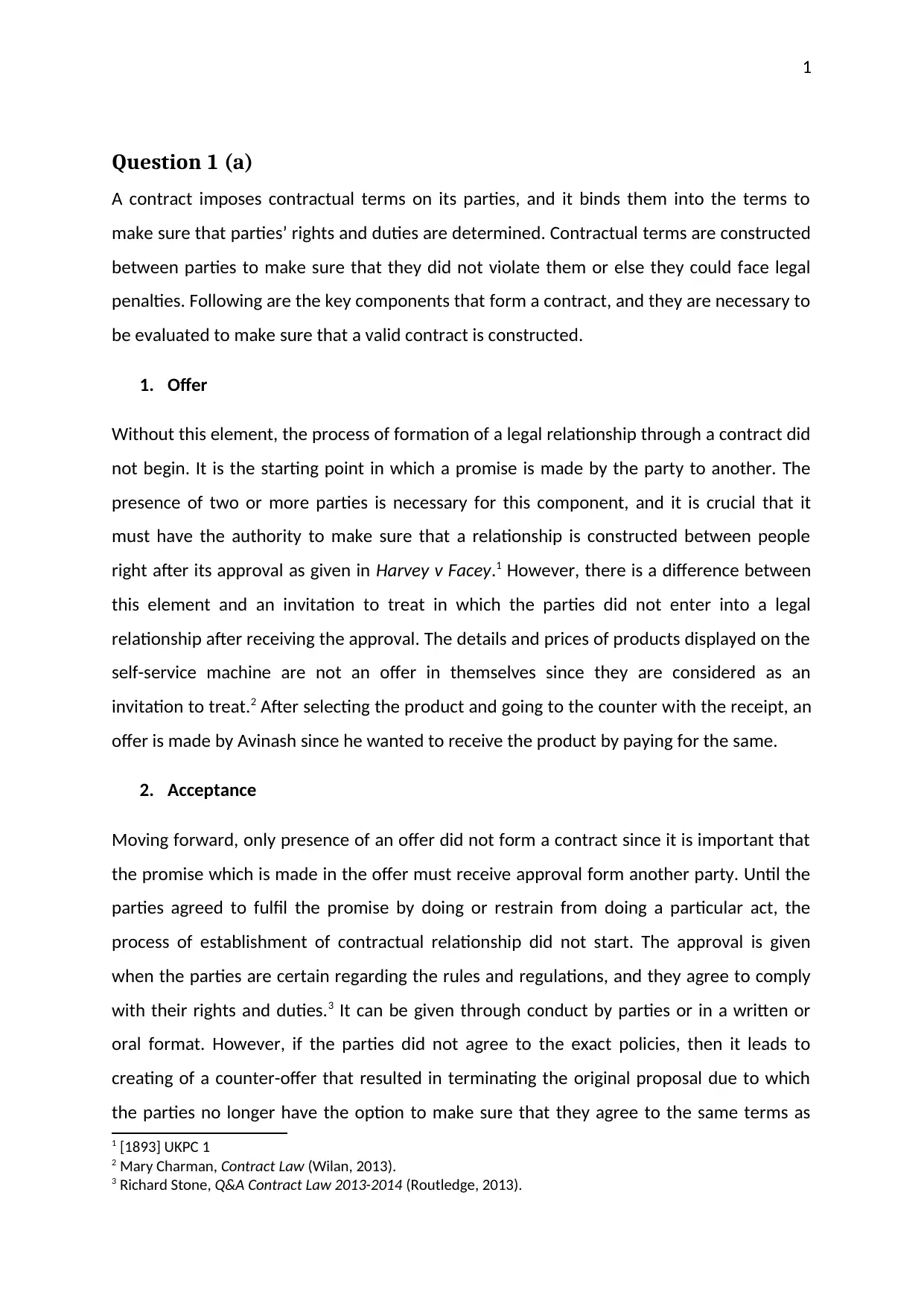
1
Question 1 (a)
A contract imposes contractual terms on its parties, and it binds them into the terms to
make sure that parties’ rights and duties are determined. Contractual terms are constructed
between parties to make sure that they did not violate them or else they could face legal
penalties. Following are the key components that form a contract, and they are necessary to
be evaluated to make sure that a valid contract is constructed.
1. Offer
Without this element, the process of formation of a legal relationship through a contract did
not begin. It is the starting point in which a promise is made by the party to another. The
presence of two or more parties is necessary for this component, and it is crucial that it
must have the authority to make sure that a relationship is constructed between people
right after its approval as given in Harvey v Facey.1 However, there is a difference between
this element and an invitation to treat in which the parties did not enter into a legal
relationship after receiving the approval. The details and prices of products displayed on the
self-service machine are not an offer in themselves since they are considered as an
invitation to treat.2 After selecting the product and going to the counter with the receipt, an
offer is made by Avinash since he wanted to receive the product by paying for the same.
2. Acceptance
Moving forward, only presence of an offer did not form a contract since it is important that
the promise which is made in the offer must receive approval form another party. Until the
parties agreed to fulfil the promise by doing or restrain from doing a particular act, the
process of establishment of contractual relationship did not start. The approval is given
when the parties are certain regarding the rules and regulations, and they agree to comply
with their rights and duties.3 It can be given through conduct by parties or in a written or
oral format. However, if the parties did not agree to the exact policies, then it leads to
creating of a counter-offer that resulted in terminating the original proposal due to which
the parties no longer have the option to make sure that they agree to the same terms as
1 [1893] UKPC 1
2 Mary Charman, Contract Law (Wilan, 2013).
3 Richard Stone, Q&A Contract Law 2013-2014 (Routledge, 2013).
Question 1 (a)
A contract imposes contractual terms on its parties, and it binds them into the terms to
make sure that parties’ rights and duties are determined. Contractual terms are constructed
between parties to make sure that they did not violate them or else they could face legal
penalties. Following are the key components that form a contract, and they are necessary to
be evaluated to make sure that a valid contract is constructed.
1. Offer
Without this element, the process of formation of a legal relationship through a contract did
not begin. It is the starting point in which a promise is made by the party to another. The
presence of two or more parties is necessary for this component, and it is crucial that it
must have the authority to make sure that a relationship is constructed between people
right after its approval as given in Harvey v Facey.1 However, there is a difference between
this element and an invitation to treat in which the parties did not enter into a legal
relationship after receiving the approval. The details and prices of products displayed on the
self-service machine are not an offer in themselves since they are considered as an
invitation to treat.2 After selecting the product and going to the counter with the receipt, an
offer is made by Avinash since he wanted to receive the product by paying for the same.
2. Acceptance
Moving forward, only presence of an offer did not form a contract since it is important that
the promise which is made in the offer must receive approval form another party. Until the
parties agreed to fulfil the promise by doing or restrain from doing a particular act, the
process of establishment of contractual relationship did not start. The approval is given
when the parties are certain regarding the rules and regulations, and they agree to comply
with their rights and duties.3 It can be given through conduct by parties or in a written or
oral format. However, if the parties did not agree to the exact policies, then it leads to
creating of a counter-offer that resulted in terminating the original proposal due to which
the parties no longer have the option to make sure that they agree to the same terms as
1 [1893] UKPC 1
2 Mary Charman, Contract Law (Wilan, 2013).
3 Richard Stone, Q&A Contract Law 2013-2014 (Routledge, 2013).
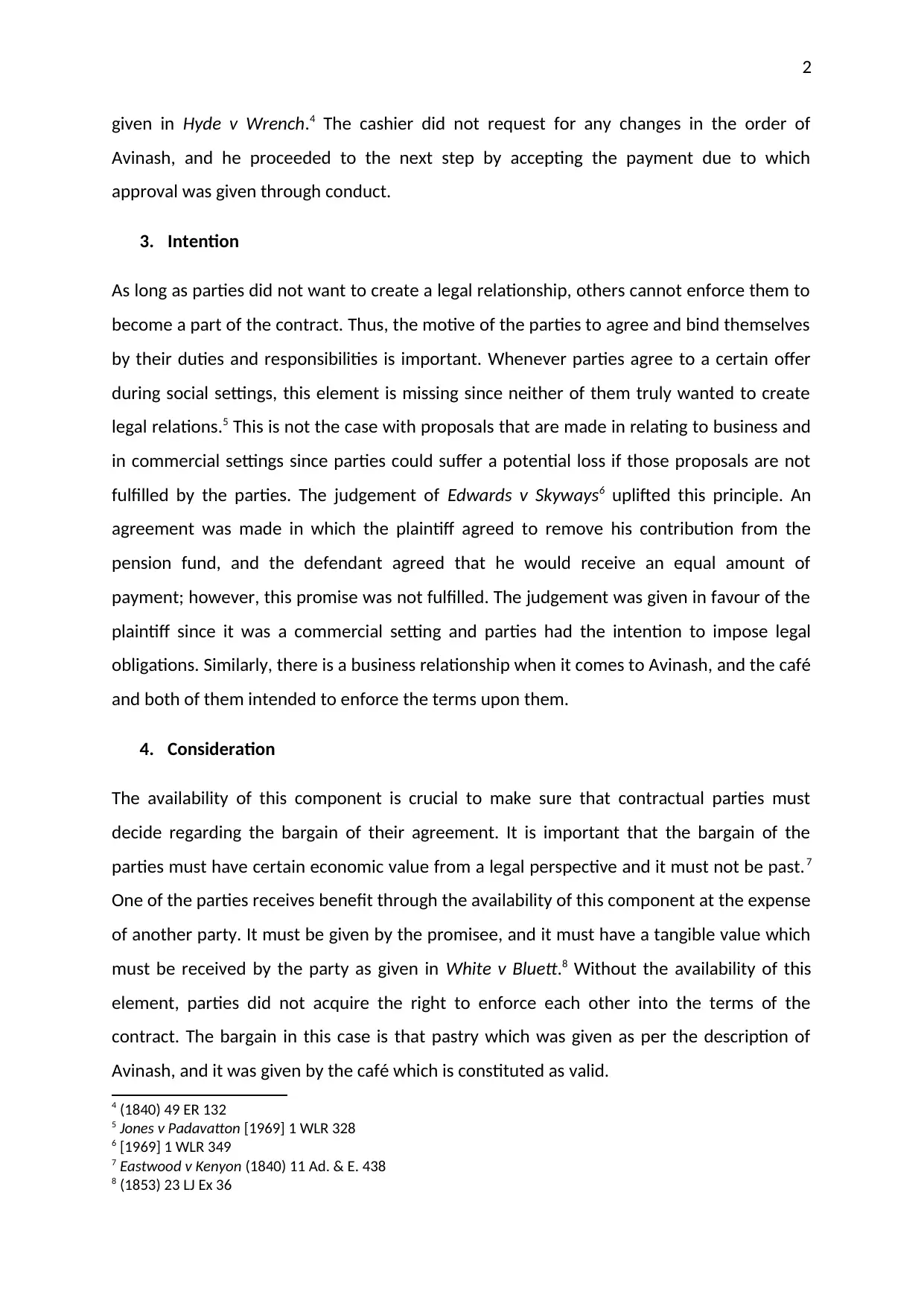
2
given in Hyde v Wrench.4 The cashier did not request for any changes in the order of
Avinash, and he proceeded to the next step by accepting the payment due to which
approval was given through conduct.
3. Intention
As long as parties did not want to create a legal relationship, others cannot enforce them to
become a part of the contract. Thus, the motive of the parties to agree and bind themselves
by their duties and responsibilities is important. Whenever parties agree to a certain offer
during social settings, this element is missing since neither of them truly wanted to create
legal relations.5 This is not the case with proposals that are made in relating to business and
in commercial settings since parties could suffer a potential loss if those proposals are not
fulfilled by the parties. The judgement of Edwards v Skyways6 uplifted this principle. An
agreement was made in which the plaintiff agreed to remove his contribution from the
pension fund, and the defendant agreed that he would receive an equal amount of
payment; however, this promise was not fulfilled. The judgement was given in favour of the
plaintiff since it was a commercial setting and parties had the intention to impose legal
obligations. Similarly, there is a business relationship when it comes to Avinash, and the café
and both of them intended to enforce the terms upon them.
4. Consideration
The availability of this component is crucial to make sure that contractual parties must
decide regarding the bargain of their agreement. It is important that the bargain of the
parties must have certain economic value from a legal perspective and it must not be past.7
One of the parties receives benefit through the availability of this component at the expense
of another party. It must be given by the promisee, and it must have a tangible value which
must be received by the party as given in White v Bluett.8 Without the availability of this
element, parties did not acquire the right to enforce each other into the terms of the
contract. The bargain in this case is that pastry which was given as per the description of
Avinash, and it was given by the café which is constituted as valid.
4 (1840) 49 ER 132
5 Jones v Padavatton [1969] 1 WLR 328
6 [1969] 1 WLR 349
7 Eastwood v Kenyon (1840) 11 Ad. & E. 438
8 (1853) 23 LJ Ex 36
given in Hyde v Wrench.4 The cashier did not request for any changes in the order of
Avinash, and he proceeded to the next step by accepting the payment due to which
approval was given through conduct.
3. Intention
As long as parties did not want to create a legal relationship, others cannot enforce them to
become a part of the contract. Thus, the motive of the parties to agree and bind themselves
by their duties and responsibilities is important. Whenever parties agree to a certain offer
during social settings, this element is missing since neither of them truly wanted to create
legal relations.5 This is not the case with proposals that are made in relating to business and
in commercial settings since parties could suffer a potential loss if those proposals are not
fulfilled by the parties. The judgement of Edwards v Skyways6 uplifted this principle. An
agreement was made in which the plaintiff agreed to remove his contribution from the
pension fund, and the defendant agreed that he would receive an equal amount of
payment; however, this promise was not fulfilled. The judgement was given in favour of the
plaintiff since it was a commercial setting and parties had the intention to impose legal
obligations. Similarly, there is a business relationship when it comes to Avinash, and the café
and both of them intended to enforce the terms upon them.
4. Consideration
The availability of this component is crucial to make sure that contractual parties must
decide regarding the bargain of their agreement. It is important that the bargain of the
parties must have certain economic value from a legal perspective and it must not be past.7
One of the parties receives benefit through the availability of this component at the expense
of another party. It must be given by the promisee, and it must have a tangible value which
must be received by the party as given in White v Bluett.8 Without the availability of this
element, parties did not acquire the right to enforce each other into the terms of the
contract. The bargain in this case is that pastry which was given as per the description of
Avinash, and it was given by the café which is constituted as valid.
4 (1840) 49 ER 132
5 Jones v Padavatton [1969] 1 WLR 328
6 [1969] 1 WLR 349
7 Eastwood v Kenyon (1840) 11 Ad. & E. 438
8 (1853) 23 LJ Ex 36
⊘ This is a preview!⊘
Do you want full access?
Subscribe today to unlock all pages.

Trusted by 1+ million students worldwide
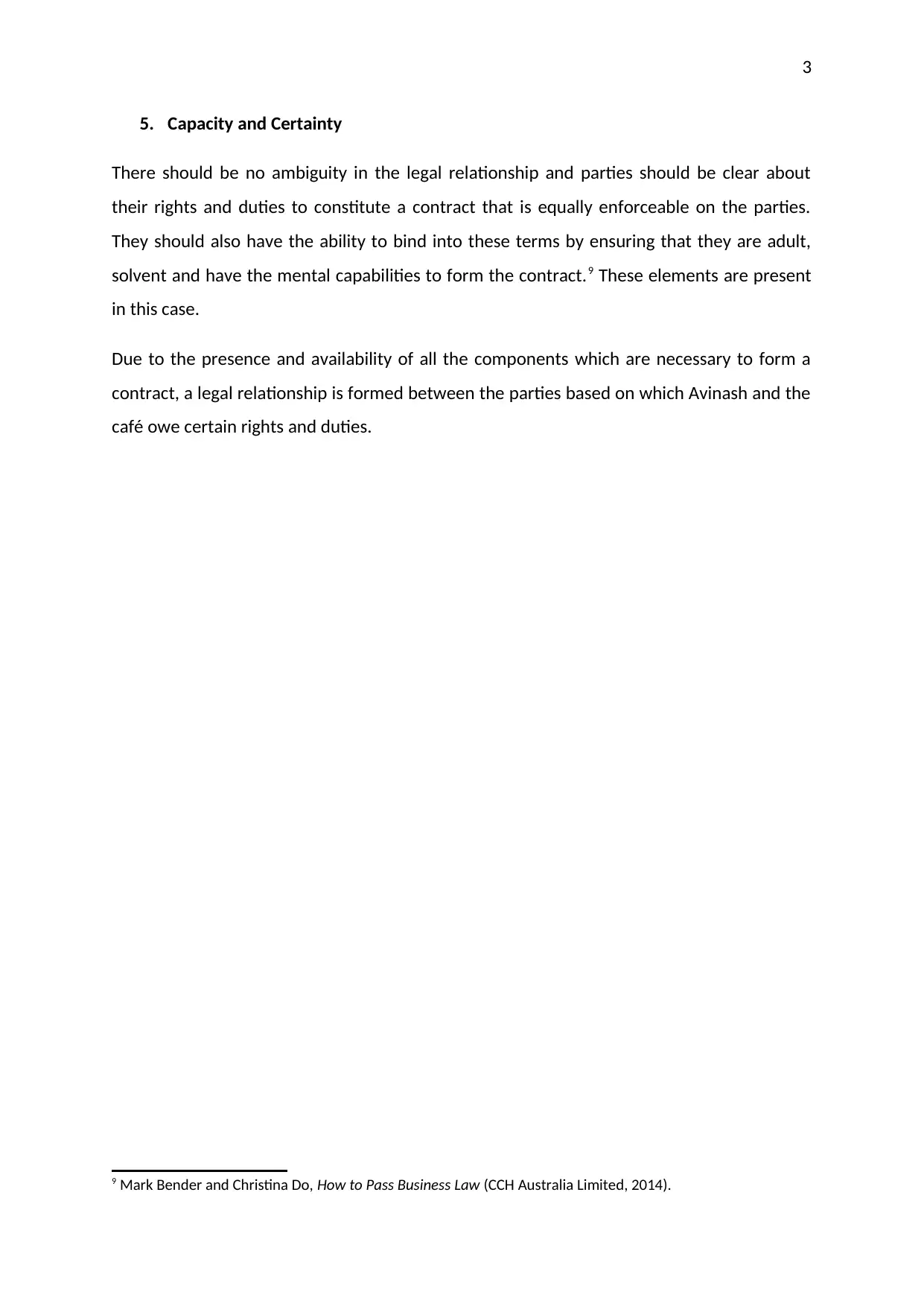
3
5. Capacity and Certainty
There should be no ambiguity in the legal relationship and parties should be clear about
their rights and duties to constitute a contract that is equally enforceable on the parties.
They should also have the ability to bind into these terms by ensuring that they are adult,
solvent and have the mental capabilities to form the contract.9 These elements are present
in this case.
Due to the presence and availability of all the components which are necessary to form a
contract, a legal relationship is formed between the parties based on which Avinash and the
café owe certain rights and duties.
9 Mark Bender and Christina Do, How to Pass Business Law (CCH Australia Limited, 2014).
5. Capacity and Certainty
There should be no ambiguity in the legal relationship and parties should be clear about
their rights and duties to constitute a contract that is equally enforceable on the parties.
They should also have the ability to bind into these terms by ensuring that they are adult,
solvent and have the mental capabilities to form the contract.9 These elements are present
in this case.
Due to the presence and availability of all the components which are necessary to form a
contract, a legal relationship is formed between the parties based on which Avinash and the
café owe certain rights and duties.
9 Mark Bender and Christina Do, How to Pass Business Law (CCH Australia Limited, 2014).
Paraphrase This Document
Need a fresh take? Get an instant paraphrase of this document with our AI Paraphraser
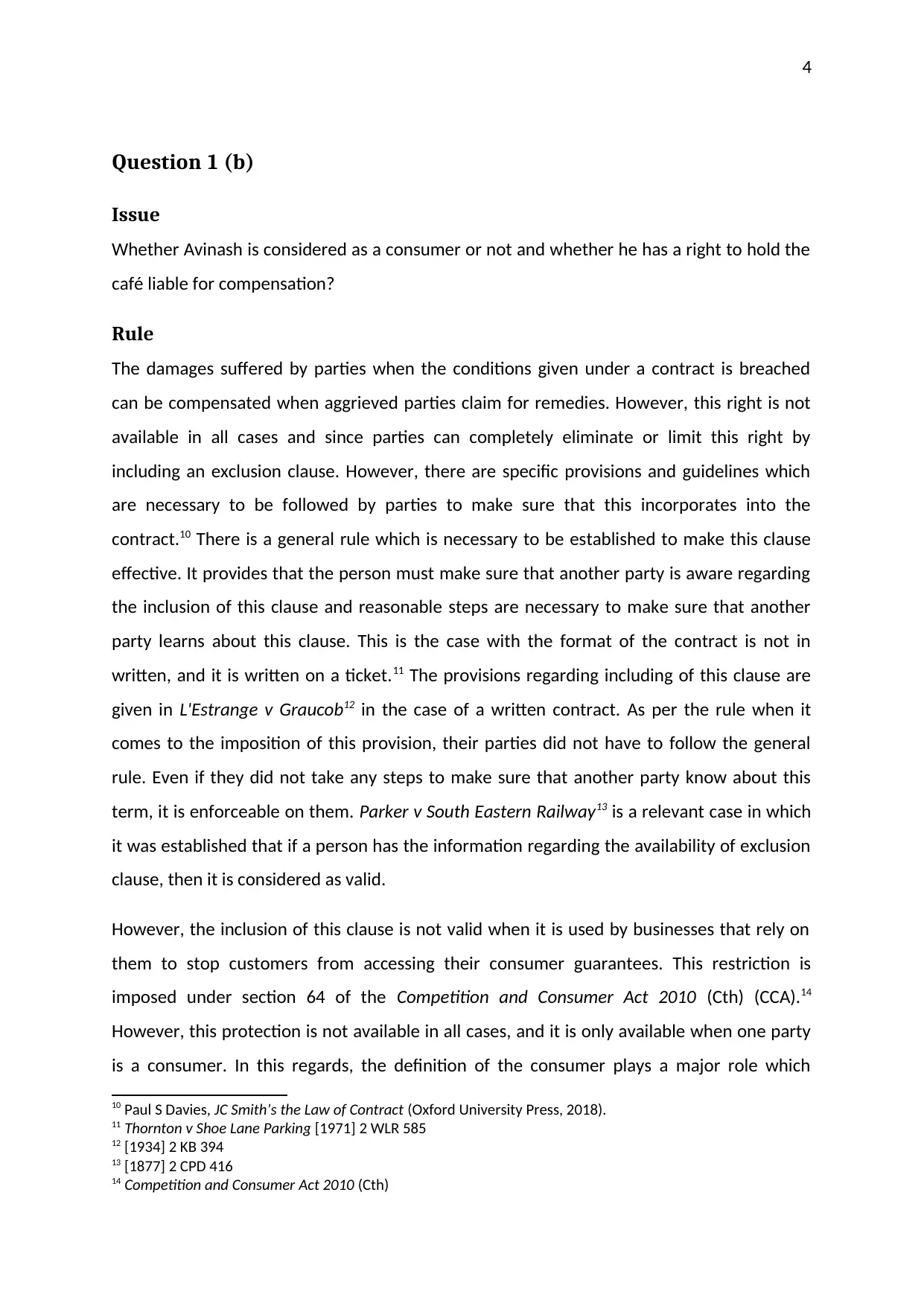
4
Question 1 (b)
Issue
Whether Avinash is considered as a consumer or not and whether he has a right to hold the
café liable for compensation?
Rule
The damages suffered by parties when the conditions given under a contract is breached
can be compensated when aggrieved parties claim for remedies. However, this right is not
available in all cases and since parties can completely eliminate or limit this right by
including an exclusion clause. However, there are specific provisions and guidelines which
are necessary to be followed by parties to make sure that this incorporates into the
contract.10 There is a general rule which is necessary to be established to make this clause
effective. It provides that the person must make sure that another party is aware regarding
the inclusion of this clause and reasonable steps are necessary to make sure that another
party learns about this clause. This is the case with the format of the contract is not in
written, and it is written on a ticket.11 The provisions regarding including of this clause are
given in L'Estrange v Graucob12 in the case of a written contract. As per the rule when it
comes to the imposition of this provision, their parties did not have to follow the general
rule. Even if they did not take any steps to make sure that another party know about this
term, it is enforceable on them. Parker v South Eastern Railway13 is a relevant case in which
it was established that if a person has the information regarding the availability of exclusion
clause, then it is considered as valid.
However, the inclusion of this clause is not valid when it is used by businesses that rely on
them to stop customers from accessing their consumer guarantees. This restriction is
imposed under section 64 of the Competition and Consumer Act 2010 (Cth) (CCA).14
However, this protection is not available in all cases, and it is only available when one party
is a consumer. In this regards, the definition of the consumer plays a major role which
10 Paul S Davies, JC Smith’s the Law of Contract (Oxford University Press, 2018).
11 Thornton v Shoe Lane Parking [1971] 2 WLR 585
12 [1934] 2 KB 394
13 [1877] 2 CPD 416
14 Competition and Consumer Act 2010 (Cth)
Question 1 (b)
Issue
Whether Avinash is considered as a consumer or not and whether he has a right to hold the
café liable for compensation?
Rule
The damages suffered by parties when the conditions given under a contract is breached
can be compensated when aggrieved parties claim for remedies. However, this right is not
available in all cases and since parties can completely eliminate or limit this right by
including an exclusion clause. However, there are specific provisions and guidelines which
are necessary to be followed by parties to make sure that this incorporates into the
contract.10 There is a general rule which is necessary to be established to make this clause
effective. It provides that the person must make sure that another party is aware regarding
the inclusion of this clause and reasonable steps are necessary to make sure that another
party learns about this clause. This is the case with the format of the contract is not in
written, and it is written on a ticket.11 The provisions regarding including of this clause are
given in L'Estrange v Graucob12 in the case of a written contract. As per the rule when it
comes to the imposition of this provision, their parties did not have to follow the general
rule. Even if they did not take any steps to make sure that another party know about this
term, it is enforceable on them. Parker v South Eastern Railway13 is a relevant case in which
it was established that if a person has the information regarding the availability of exclusion
clause, then it is considered as valid.
However, the inclusion of this clause is not valid when it is used by businesses that rely on
them to stop customers from accessing their consumer guarantees. This restriction is
imposed under section 64 of the Competition and Consumer Act 2010 (Cth) (CCA).14
However, this protection is not available in all cases, and it is only available when one party
is a consumer. In this regards, the definition of the consumer plays a major role which
10 Paul S Davies, JC Smith’s the Law of Contract (Oxford University Press, 2018).
11 Thornton v Shoe Lane Parking [1971] 2 WLR 585
12 [1934] 2 KB 394
13 [1877] 2 CPD 416
14 Competition and Consumer Act 2010 (Cth)
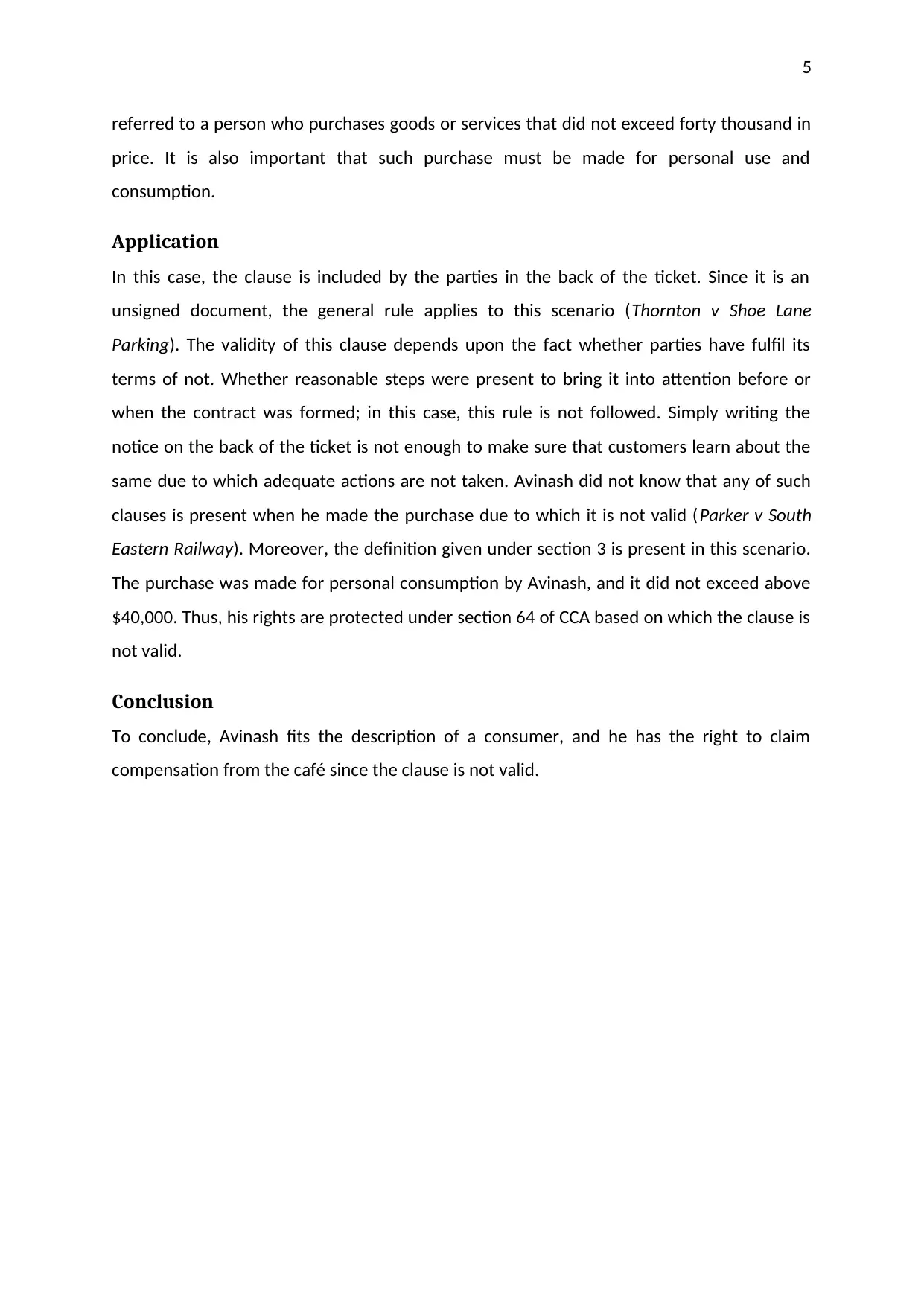
5
referred to a person who purchases goods or services that did not exceed forty thousand in
price. It is also important that such purchase must be made for personal use and
consumption.
Application
In this case, the clause is included by the parties in the back of the ticket. Since it is an
unsigned document, the general rule applies to this scenario (Thornton v Shoe Lane
Parking). The validity of this clause depends upon the fact whether parties have fulfil its
terms of not. Whether reasonable steps were present to bring it into attention before or
when the contract was formed; in this case, this rule is not followed. Simply writing the
notice on the back of the ticket is not enough to make sure that customers learn about the
same due to which adequate actions are not taken. Avinash did not know that any of such
clauses is present when he made the purchase due to which it is not valid (Parker v South
Eastern Railway). Moreover, the definition given under section 3 is present in this scenario.
The purchase was made for personal consumption by Avinash, and it did not exceed above
$40,000. Thus, his rights are protected under section 64 of CCA based on which the clause is
not valid.
Conclusion
To conclude, Avinash fits the description of a consumer, and he has the right to claim
compensation from the café since the clause is not valid.
referred to a person who purchases goods or services that did not exceed forty thousand in
price. It is also important that such purchase must be made for personal use and
consumption.
Application
In this case, the clause is included by the parties in the back of the ticket. Since it is an
unsigned document, the general rule applies to this scenario (Thornton v Shoe Lane
Parking). The validity of this clause depends upon the fact whether parties have fulfil its
terms of not. Whether reasonable steps were present to bring it into attention before or
when the contract was formed; in this case, this rule is not followed. Simply writing the
notice on the back of the ticket is not enough to make sure that customers learn about the
same due to which adequate actions are not taken. Avinash did not know that any of such
clauses is present when he made the purchase due to which it is not valid (Parker v South
Eastern Railway). Moreover, the definition given under section 3 is present in this scenario.
The purchase was made for personal consumption by Avinash, and it did not exceed above
$40,000. Thus, his rights are protected under section 64 of CCA based on which the clause is
not valid.
Conclusion
To conclude, Avinash fits the description of a consumer, and he has the right to claim
compensation from the café since the clause is not valid.
⊘ This is a preview!⊘
Do you want full access?
Subscribe today to unlock all pages.

Trusted by 1+ million students worldwide
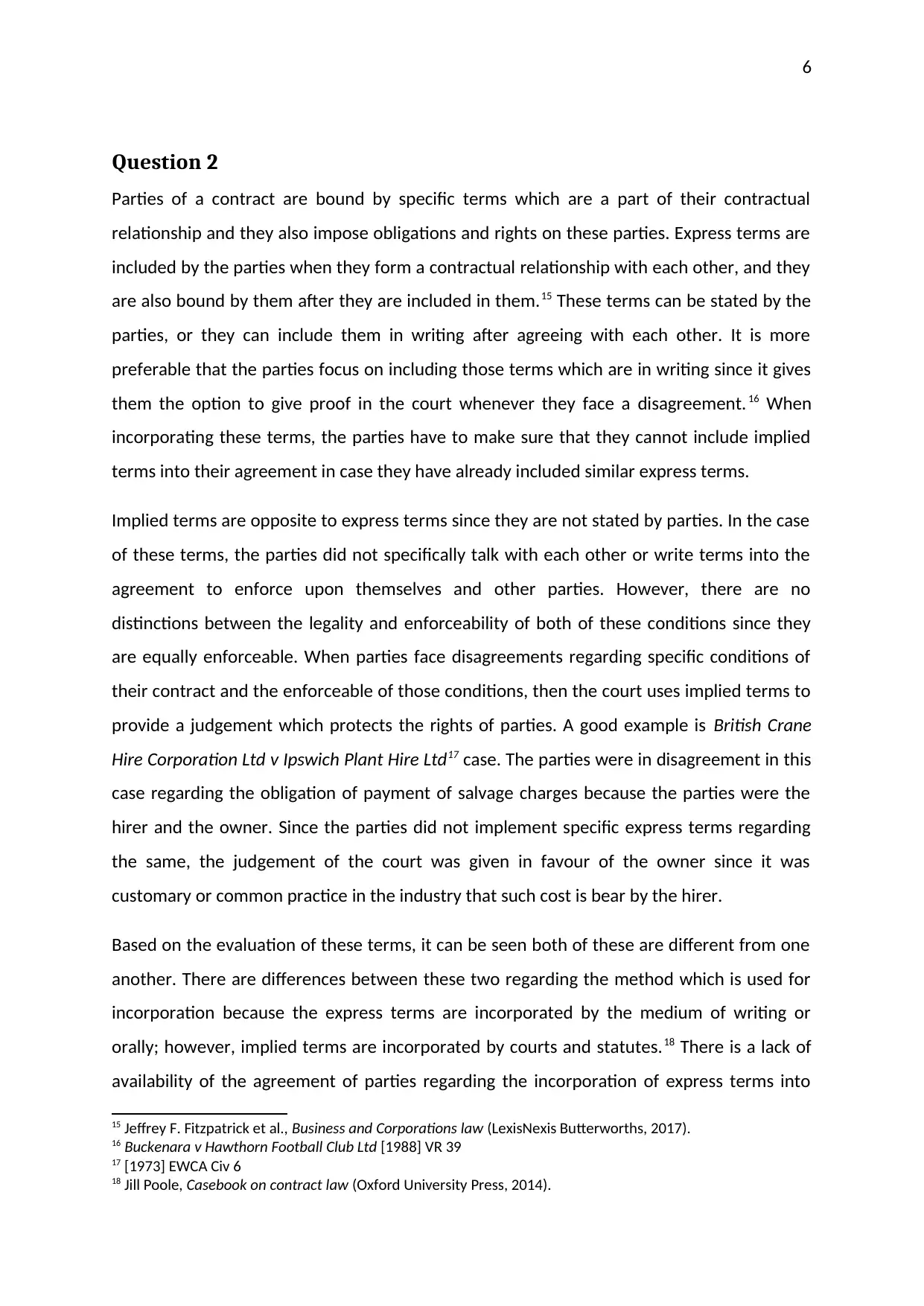
6
Question 2
Parties of a contract are bound by specific terms which are a part of their contractual
relationship and they also impose obligations and rights on these parties. Express terms are
included by the parties when they form a contractual relationship with each other, and they
are also bound by them after they are included in them.15 These terms can be stated by the
parties, or they can include them in writing after agreeing with each other. It is more
preferable that the parties focus on including those terms which are in writing since it gives
them the option to give proof in the court whenever they face a disagreement.16 When
incorporating these terms, the parties have to make sure that they cannot include implied
terms into their agreement in case they have already included similar express terms.
Implied terms are opposite to express terms since they are not stated by parties. In the case
of these terms, the parties did not specifically talk with each other or write terms into the
agreement to enforce upon themselves and other parties. However, there are no
distinctions between the legality and enforceability of both of these conditions since they
are equally enforceable. When parties face disagreements regarding specific conditions of
their contract and the enforceable of those conditions, then the court uses implied terms to
provide a judgement which protects the rights of parties. A good example is British Crane
Hire Corporation Ltd v Ipswich Plant Hire Ltd17 case. The parties were in disagreement in this
case regarding the obligation of payment of salvage charges because the parties were the
hirer and the owner. Since the parties did not implement specific express terms regarding
the same, the judgement of the court was given in favour of the owner since it was
customary or common practice in the industry that such cost is bear by the hirer.
Based on the evaluation of these terms, it can be seen both of these are different from one
another. There are differences between these two regarding the method which is used for
incorporation because the express terms are incorporated by the medium of writing or
orally; however, implied terms are incorporated by courts and statutes.18 There is a lack of
availability of the agreement of parties regarding the incorporation of express terms into
15 Jeffrey F. Fitzpatrick et al., Business and Corporations law (LexisNexis Butterworths, 2017).
16 Buckenara v Hawthorn Football Club Ltd [1988] VR 39
17 [1973] EWCA Civ 6
18 Jill Poole, Casebook on contract law (Oxford University Press, 2014).
Question 2
Parties of a contract are bound by specific terms which are a part of their contractual
relationship and they also impose obligations and rights on these parties. Express terms are
included by the parties when they form a contractual relationship with each other, and they
are also bound by them after they are included in them.15 These terms can be stated by the
parties, or they can include them in writing after agreeing with each other. It is more
preferable that the parties focus on including those terms which are in writing since it gives
them the option to give proof in the court whenever they face a disagreement.16 When
incorporating these terms, the parties have to make sure that they cannot include implied
terms into their agreement in case they have already included similar express terms.
Implied terms are opposite to express terms since they are not stated by parties. In the case
of these terms, the parties did not specifically talk with each other or write terms into the
agreement to enforce upon themselves and other parties. However, there are no
distinctions between the legality and enforceability of both of these conditions since they
are equally enforceable. When parties face disagreements regarding specific conditions of
their contract and the enforceable of those conditions, then the court uses implied terms to
provide a judgement which protects the rights of parties. A good example is British Crane
Hire Corporation Ltd v Ipswich Plant Hire Ltd17 case. The parties were in disagreement in this
case regarding the obligation of payment of salvage charges because the parties were the
hirer and the owner. Since the parties did not implement specific express terms regarding
the same, the judgement of the court was given in favour of the owner since it was
customary or common practice in the industry that such cost is bear by the hirer.
Based on the evaluation of these terms, it can be seen both of these are different from one
another. There are differences between these two regarding the method which is used for
incorporation because the express terms are incorporated by the medium of writing or
orally; however, implied terms are incorporated by courts and statutes.18 There is a lack of
availability of the agreement of parties regarding the incorporation of express terms into
15 Jeffrey F. Fitzpatrick et al., Business and Corporations law (LexisNexis Butterworths, 2017).
16 Buckenara v Hawthorn Football Club Ltd [1988] VR 39
17 [1973] EWCA Civ 6
18 Jill Poole, Casebook on contract law (Oxford University Press, 2014).
Paraphrase This Document
Need a fresh take? Get an instant paraphrase of this document with our AI Paraphraser
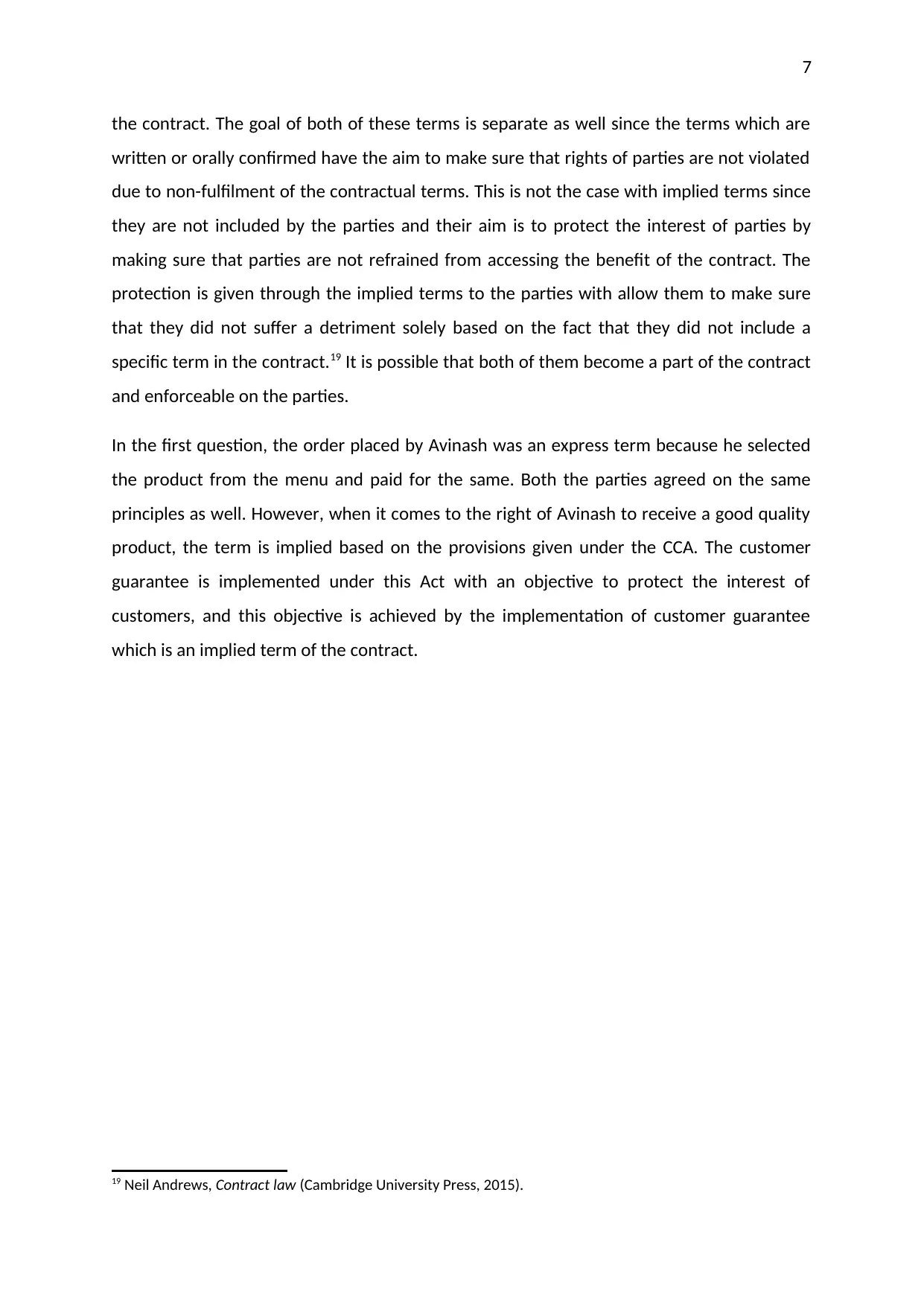
7
the contract. The goal of both of these terms is separate as well since the terms which are
written or orally confirmed have the aim to make sure that rights of parties are not violated
due to non-fulfilment of the contractual terms. This is not the case with implied terms since
they are not included by the parties and their aim is to protect the interest of parties by
making sure that parties are not refrained from accessing the benefit of the contract. The
protection is given through the implied terms to the parties with allow them to make sure
that they did not suffer a detriment solely based on the fact that they did not include a
specific term in the contract.19 It is possible that both of them become a part of the contract
and enforceable on the parties.
In the first question, the order placed by Avinash was an express term because he selected
the product from the menu and paid for the same. Both the parties agreed on the same
principles as well. However, when it comes to the right of Avinash to receive a good quality
product, the term is implied based on the provisions given under the CCA. The customer
guarantee is implemented under this Act with an objective to protect the interest of
customers, and this objective is achieved by the implementation of customer guarantee
which is an implied term of the contract.
19 Neil Andrews, Contract law (Cambridge University Press, 2015).
the contract. The goal of both of these terms is separate as well since the terms which are
written or orally confirmed have the aim to make sure that rights of parties are not violated
due to non-fulfilment of the contractual terms. This is not the case with implied terms since
they are not included by the parties and their aim is to protect the interest of parties by
making sure that parties are not refrained from accessing the benefit of the contract. The
protection is given through the implied terms to the parties with allow them to make sure
that they did not suffer a detriment solely based on the fact that they did not include a
specific term in the contract.19 It is possible that both of them become a part of the contract
and enforceable on the parties.
In the first question, the order placed by Avinash was an express term because he selected
the product from the menu and paid for the same. Both the parties agreed on the same
principles as well. However, when it comes to the right of Avinash to receive a good quality
product, the term is implied based on the provisions given under the CCA. The customer
guarantee is implemented under this Act with an objective to protect the interest of
customers, and this objective is achieved by the implementation of customer guarantee
which is an implied term of the contract.
19 Neil Andrews, Contract law (Cambridge University Press, 2015).
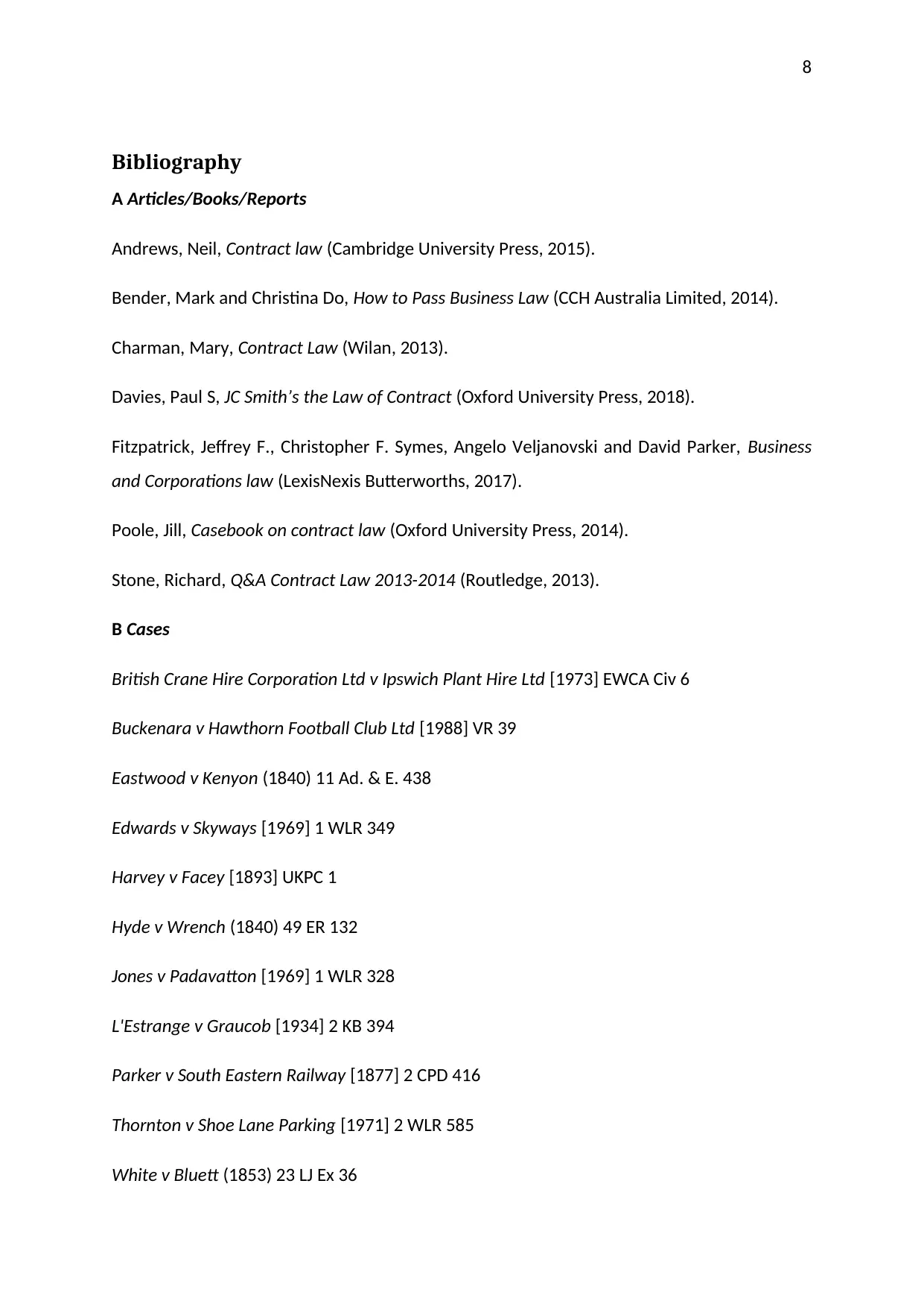
8
Bibliography
A Articles/Books/Reports
Andrews, Neil, Contract law (Cambridge University Press, 2015).
Bender, Mark and Christina Do, How to Pass Business Law (CCH Australia Limited, 2014).
Charman, Mary, Contract Law (Wilan, 2013).
Davies, Paul S, JC Smith’s the Law of Contract (Oxford University Press, 2018).
Fitzpatrick, Jeffrey F., Christopher F. Symes, Angelo Veljanovski and David Parker, Business
and Corporations law (LexisNexis Butterworths, 2017).
Poole, Jill, Casebook on contract law (Oxford University Press, 2014).
Stone, Richard, Q&A Contract Law 2013-2014 (Routledge, 2013).
B Cases
British Crane Hire Corporation Ltd v Ipswich Plant Hire Ltd [1973] EWCA Civ 6
Buckenara v Hawthorn Football Club Ltd [1988] VR 39
Eastwood v Kenyon (1840) 11 Ad. & E. 438
Edwards v Skyways [1969] 1 WLR 349
Harvey v Facey [1893] UKPC 1
Hyde v Wrench (1840) 49 ER 132
Jones v Padavatton [1969] 1 WLR 328
L'Estrange v Graucob [1934] 2 KB 394
Parker v South Eastern Railway [1877] 2 CPD 416
Thornton v Shoe Lane Parking [1971] 2 WLR 585
White v Bluett (1853) 23 LJ Ex 36
Bibliography
A Articles/Books/Reports
Andrews, Neil, Contract law (Cambridge University Press, 2015).
Bender, Mark and Christina Do, How to Pass Business Law (CCH Australia Limited, 2014).
Charman, Mary, Contract Law (Wilan, 2013).
Davies, Paul S, JC Smith’s the Law of Contract (Oxford University Press, 2018).
Fitzpatrick, Jeffrey F., Christopher F. Symes, Angelo Veljanovski and David Parker, Business
and Corporations law (LexisNexis Butterworths, 2017).
Poole, Jill, Casebook on contract law (Oxford University Press, 2014).
Stone, Richard, Q&A Contract Law 2013-2014 (Routledge, 2013).
B Cases
British Crane Hire Corporation Ltd v Ipswich Plant Hire Ltd [1973] EWCA Civ 6
Buckenara v Hawthorn Football Club Ltd [1988] VR 39
Eastwood v Kenyon (1840) 11 Ad. & E. 438
Edwards v Skyways [1969] 1 WLR 349
Harvey v Facey [1893] UKPC 1
Hyde v Wrench (1840) 49 ER 132
Jones v Padavatton [1969] 1 WLR 328
L'Estrange v Graucob [1934] 2 KB 394
Parker v South Eastern Railway [1877] 2 CPD 416
Thornton v Shoe Lane Parking [1971] 2 WLR 585
White v Bluett (1853) 23 LJ Ex 36
⊘ This is a preview!⊘
Do you want full access?
Subscribe today to unlock all pages.

Trusted by 1+ million students worldwide

9
C Legislation
Competition and Consumer Act 2010 (Cth)
C Legislation
Competition and Consumer Act 2010 (Cth)
1 out of 10
Related Documents
Your All-in-One AI-Powered Toolkit for Academic Success.
+13062052269
info@desklib.com
Available 24*7 on WhatsApp / Email
![[object Object]](/_next/static/media/star-bottom.7253800d.svg)
Unlock your academic potential
Copyright © 2020–2025 A2Z Services. All Rights Reserved. Developed and managed by ZUCOL.





